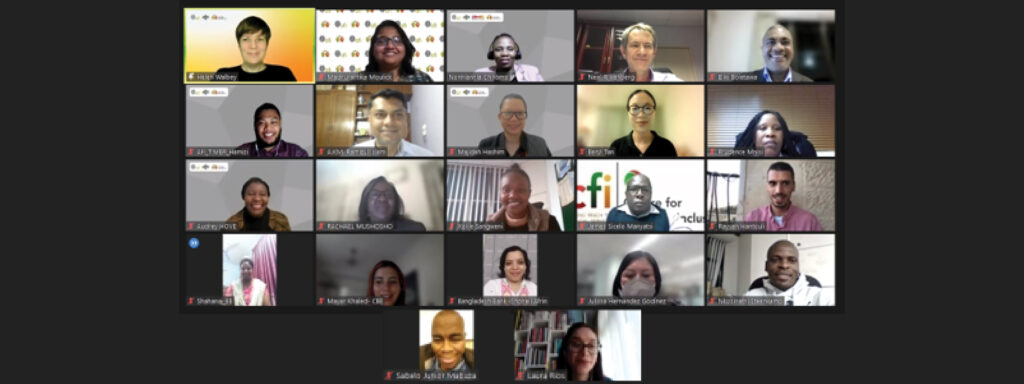Developing a coordinated approach to communicating women’s financial inclusion between policy specialists and communications experts within AFI member institutions is critical in raising awareness, educating and informing stakeholders on how to provide women access and usage of high-quality services, speakers said at AFI’s first capacity building event of the year.
AFI’s Communicating Women’s Financial Inclusion virtual member training, co-hosted with the Ministry of Finance of the Kingdom of Eswatini (MOFE) from 14 – 16 June, is expected to promote the adoption of a gender-sensitive approach to communications, leading to enhanced gender sensitivity among policymakers. Through this coordinated approach, members can develop gender sensitive communication plans, targeted at raising awareness on women’s financial inclusion.
“We must communicate our financial inclusion initiatives to the different stakeholders timely, and in a manner that will not only create visibility to our actions,” said Neal Rijkenberg, Minister of Finance for the Kingdom of Eswatini. The minister stressed the importance of communications strategies and the need to be deliberate on what and how we want to communicate. The minister also highlighted the need to choose communication channels that are easily accessible and understood so that target markets can make informed decisions.
Communications played a pivotal role during the COVID-19 pandemic, where access to accurate and timely information was a crucial component of recovery plans across the globe, highlighted Nomcebo Hadebe, Chief Executive Officer of Eswatini’s Center for Financial Inclusion in her opening remarks.

“Similarly, effective communication of women’s financial inclusion initiatives requires carefully coordinated planning to ensure all stakeholders receive necessary information,” said Hadebe who also highlighted the importance for information to be culturally sensitive and delivered through channels that respondents can easily access and understand.
This sentiment was echoed by Superintendent Dr Margarita Hernandez from the Superintendencia de Economia Popular y Solidaria (SEPS). According to Dr Hernandez, communication is key to women’s financial inclusion in SEPS.
“All our policy and regulatory initiatives comes with a communication strategy and SEPS is on all communication platforms,” said Dr Hernandez. Dr Hernandez added that financial inclusion with a gender perspective has the potential to change the mindsets of not only policymakers but also all people, and encourages everyone to work with women.
According to Eliki Boletawa, AFI’s Policy, Programs and Implementation Director, the workshop is critical in promoting women’s access to finance. Boletawa cited the 2016 Denarau Action Plan (DAP) which sets out to accelerate women’s financial inclusion in members’ jurisdictions. The Director also pointed out that many AFI members have made significant progress in attaining this goal.
“At AFI we believe that strengthening communications on women’s financial inclusion can help members set specific women’s financial inclusion objectives and targets (DAP action point 7) and collaborate more effectively with key stakeholders, including government agencies, development partners and civil society (DAP action point 9) in line with the Denarau Action Plan commitments,” said Boletawa, adding that “Communication also serves to foster transparency, promote awareness, build trust, and enhance commitment among all stakeholders involved in financial inclusion.”
The three-day training is anchored on AFI’s Communicating Gender Financial Inclusion Toolkit, which provides guidance to member institutions on developing a coordinated approach to communicating on women’s financial inclusion between policy specialists and communications experts within member institutions. Through this coordinated approach, members can develop gender sensitive communication plans, targeted at raising awareness on women’s financial inclusion.
Attended by over 40 participants, the workshop also aims to improve the regulator’s knowledge of issues relating to women’s financial inclusion which will help mobilize resources and support for developing and implementing solutions that would promote more women’s access to quality financial services.
The Kingdom of Eswatini’s Ministry of Finance has been a member of AFI since 2013 and is a recipient of AFI’s in-country support to develop a gender inclusive finance roadmap. The roadmap aims to enhance the financial inclusion of women and guide financial institutions to design financial products and services that meet the needs of women.
Eswatini has since made three Maya Declaration commitments relating to gender and reported two policy changes relating to gender inclusive finance in 2017 and 2021 respectively. Through the Centre for Financial Inclusion, the MOFE is currently implementing a pilot project called the Financial Inclusion and Cluster Development Project which aims to improve access to finance for women smallholder farmers.
#
AFI’s gender inclusive finance workstream is financed by the Swedish International Development Cooperation Agency (Sida) and other partners.

 About
About
 Online
Online
 Data
Data





















